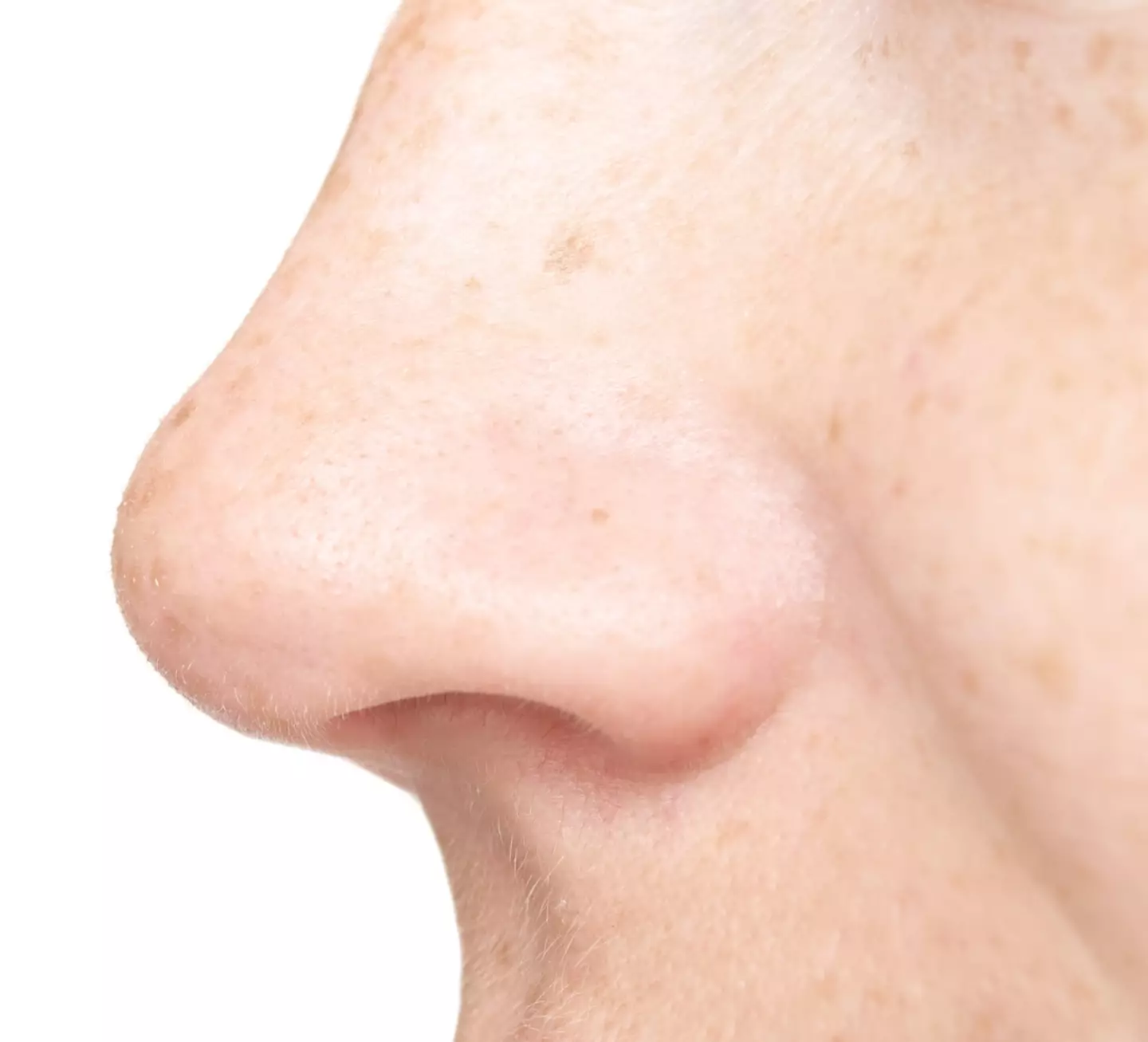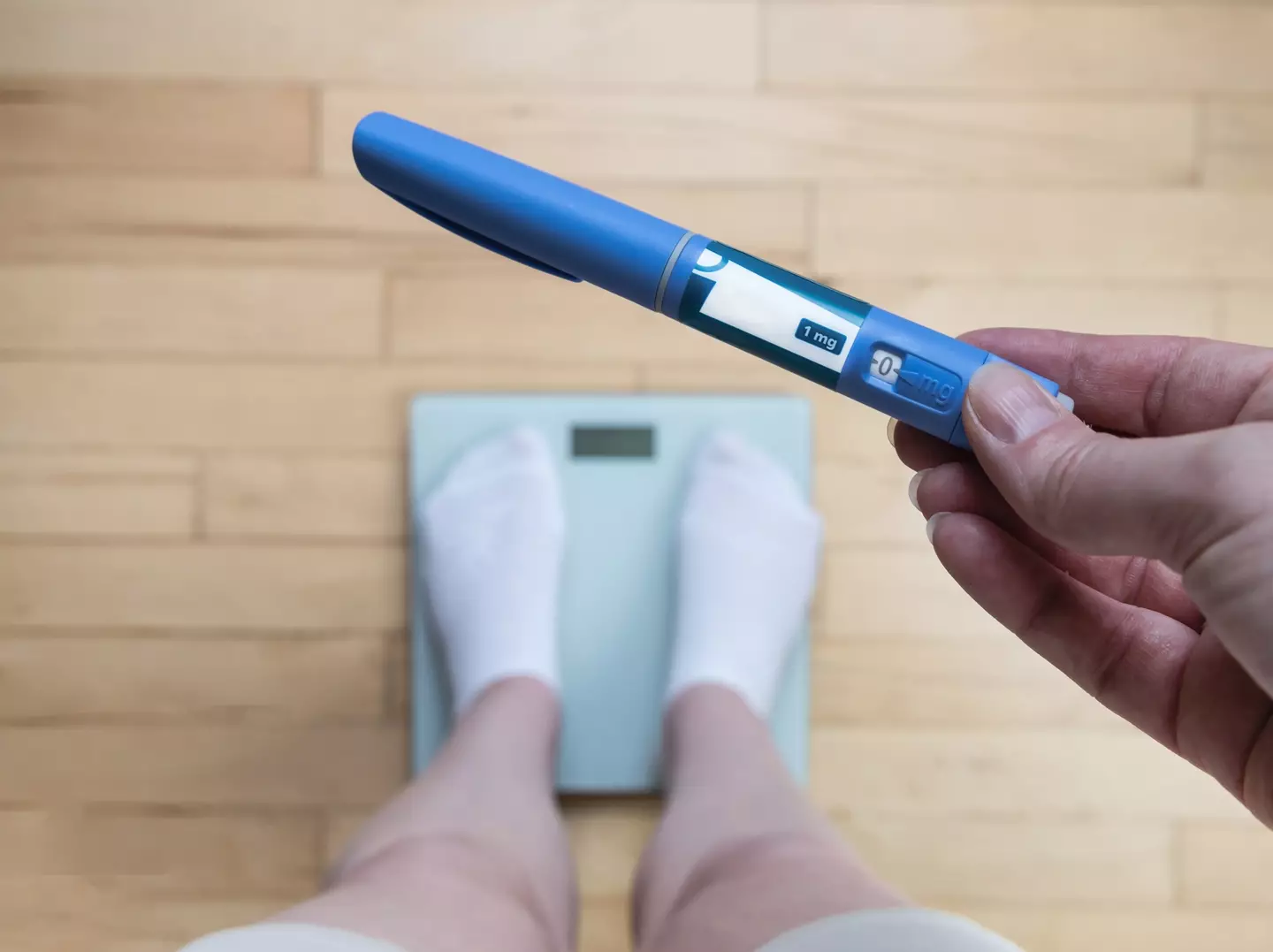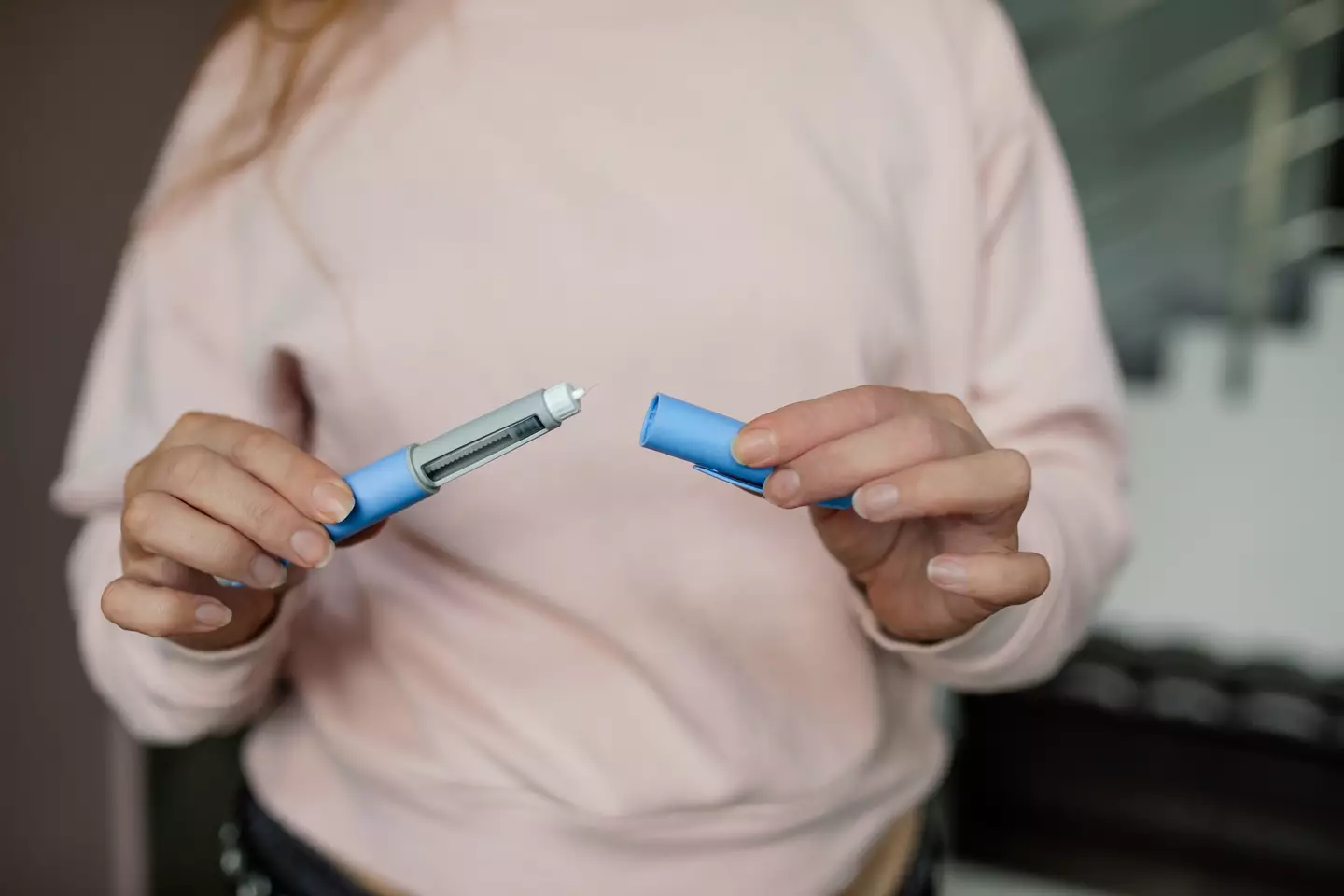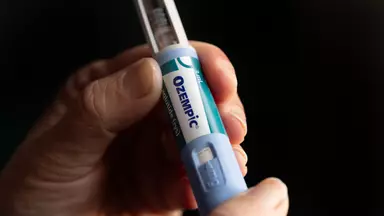Have you noticed something strange after taking Ozempic or maybe someone you know has been complaining about this one thing?
When it comes to taking weight-loss injections such as Ozempic and Wegovy, there are some things that come alongside it that aren’t generally known about.
Of course, we’ve all heard about ‘Ozempic face’, the fact that maybe your bottom will disappear and more, but smell? That’s a new thing we’re hearing about.
Now, if you don’t know already – Ozempic is a GLP-1 medication that is primarily used to help to treat diabetes.

Using Ozempic has an impact on your sense of smell (Getty stock images)
However, in recent years, people have been opting to use it to aid in weight loss, specifically because of its appetite suppressant qualities.
While it’s not approved for this use, that doesn’t stop it from being marketed that way, or for people to use it to drop a few pounds.
Along with the increase in people using the GLP-1 medications, a side-effect has emerged as being one of the strangest – smells.
No, we’re not saying that people who use Ozempic smell a certain way. It’s more so that their sense of smell changes.
According to MarkWide Research, ‘Gourmand’ fragrances have seen a huge surge in popularity, which they say is down to their indulgent scent.

The drug could make you more likely to crave different smells (Michael Siluk/UCG/Universal Images Group via Getty Images)
Similarly, New Beauty believe that those smells will see a surge in consumers buying them by 33.9 per cent this year, with caramel taking the top spot.
Obviously, you can’t eat these perfumes, so why are these things linked to Ozempic?
It’s because experts are beginning to think that there is a connection between GLP-1 drugs and sensory changes – namely, smell and taste.
With 12 per cent of the US population taking weight-loss medication, it’s no surprise that this could be attributed to the recent shift in buying more and more fragrances that smell like desserts.
Why? Because GLP-1 drugs reduce appetite by mimicking a hormone that helps to regulate blood sugar.
However, the same hormone also has receptors in parts of the brain that process smell and taste, which can either decrease or increase the intensity for some users.
Dr Priya Verma, an aesthetic doctor told the Financial Express that it could be part of a broader neurochemical shift.

Experts are suggesting they want to smell like the things they can’t eat (Owen Franken/Getty stock images)
Dr Verma said: “Your appetite for certain foods or tastes is very likely to change. If patients who are using Ozempic (or any other weight-loss injection) are having a lower oral sugar intake, it may be that they are looking to satiate the appetite receptors for those sweeter scents through a different means.”
Essentially, if you can’t eat it, you might want to smell it.
According to those within the industry, people are shifting towards ‘indulgent, addictive notes’.
Jonnie Swarbrick, the creative director at Fragrance Du Bois said: “The rise of gourmand fragrances has been undeniable. We have seen increased demand for scents that smell edible – sweet, warm, and nostalgic.”
Some of the most popular options right now include Sabrina Carpenter’s Sweet Tooth, (chocolate and marshmallow) and Sol de Janeiro’s Cheirosa 71 (pistachio, caramelised vanilla, and white chocolate).
Featured Image Credit: Corbis/Corbis via Getty Images
Topics: Food and Drink, Health, Ozempic, Science

A woman who turned to an inexpensive drink in an attempt to shed the pounds has detailed a surprising set of results.
The South American delicacy of Yerba mate has been described to have ‘similar weight-loss effects’ as Ozempic.
Ozempic, an injection marketed for people with type 2 diabetes to help them manage their blood sugar levels, has become popular in recent years among those hoping to lose weight.
Known as semaglutide, the drug was approved in 2017 by the US Food and Drug Administration (FDA) to help diabetics.
However, the drug is not approved for weight loss, so some are looking for alternatives.
Celebrities such as Jason Momoa, Gwyneth Paltrow and Tom Hardy have turned to Yerba mate, which is found across all good US retailers for the small sum of $3.

Celebrities have started having the drink (Getty Stock Photo)
And in a first-person piece for the Daily Mail, Ishita Srivastava, a health reporter at the outlet, bought a $10 tin of Yerba mate tea leaves.
She explained: “For 21 days, I brewed myself a cup of three grams of leaves using a tea infuser and I didn’t add milk or sweeteners.
“While the tea seemed bitter at first (albeit a bit less than regular green tea), I intended to drink it every single day for three weeks to see whether I would lose any weight.
“Before I started by Yerba mate journey, I weighed 132lbs (60 kgs) and was excited to see how many pounds I could drop by doing nothing more than adding a cup of tea to my daily routine.”
It took only a week for Srivastava to notice some considerable differences.
The Daily Mail reporter added: “While my weight had not significantly dropped, my body looked and felt less bloated and my digestive system was much more regular.

Yerba mate is also sold as an energy drink (Getty Stock Photo)
“But what really stood out was my increased appetite, which may have been a sign my metabolism, which breaks down food in the body to create energy, was ramping up and my body was burning fat.
“I began feeling hungrier and started having an earlier dinner.”
While there is a lot of evidence promoting stimulant benefits to taking the energy drink, taking it, especially in larger amounts can provide risks.
MedicalNewsToday reports consumption of large amounts of Yerba mate may increase the risk of some cancers due to chemicals known as polycyclic aromatic hydrocarbons being found in the drink.
And, of course, excessive caffeine consumption can increase heart rate and blood pressure.
Featured Image Credit: Getty Images/Antonio Hugo Photo

Amid its growing popularity, an expert has detailed a lesser known side effect of taking the weight loss drug Ozempic.
There are many ways to shed the pounds in 2025, from the old school method of dieting and exercise to the extreme with weight loss pills and even surgery.
Ozempic, an injection marketed for people with type 2 diabetes to help them manage their blood sugar levels, has become popular in recent years amongst those hoping to lose weight.
Known as semaglutide, the drug was approved in 2017 by the US Food and Drug Aministration (FDA) to help diabetics.
The medication is administered once every four weeks and is taken once a week, with dosages starting from 0.25mg before increasing each time to the limit of 2mg.
Dr Ben Bickman, who is a scientist and professor at Brigham Young University in Utah, has stated that muscle loss can be brought on from the use of the drug.
“You have a substantial amount of lean mass that’s getting loss as the person is losing weight. To make that clear, for every ten pounds of weight loss, only six is fat – four of it is coming from non-fat sources like muscle and bone,” he told Thomas DeLauer.

A lesser known side effect of Ozempic has been revealed (Getty Stock Photo)
Continuing on the same subject, Dr Bickman added: “While muscle and bone mass might never return, the body has no trouble regaining fat mass.
“What’s more, one study found that one version of these drugs, actually stimulates the production of new fat cells.”
The doctor added: “This becomes a problem because when a person start to regain fat mass after stopping Ozempic, with more fat cells comes a greater potential to gain more fat.
“As a result, even though a person may still weight less than they did before starting the drug, they may be fatter, with a higher percentage of body fat.”
As per Drugs.com, ‘obesity trials have shown that participants using incretin mimetic agents like semaglutide (Ozempic, Wegovy) or tirzepatide (Mounjaro, Zepbound) lost 10% or more of their muscle mass.’
This was found after clinical trials lasting up to 72 weeks long were conducted by experts.
As Ozempic is a fairly new drug, the long-term effects of taking the drugs on muscle loss remain unclear at this time.
After people conclude taking a dose of ozempic, the expert explained how many immediately put on weight.
“Ozempic is effective at reducing cravings… however well this works, it works until it doesn’t,” Dr Bickman explained.
“At around two years of use, people find that the sweet cravings return to normal.”
Featured Image Credit: YouTube/Thomas DeLauer

A doctor has issued a warning about a less documented side effect of Ozempic that can apparently have a long-term health impact.
Ozempic was initially introduced as a drug for people with Type-2 diabetes to help them manage their blood sugar levels, but has become popular in recent years for those hoping to shed the pounds.
The drug was approved in 2017 by the US Food and Drug Administration (FDA) to help diabetics, and works through its active ingredient semaglutide, which mimics the body’s natural GLP-1 hormone responsible for regulating appetite.
The medication is administered once a week, with dosages starting from 0.25mg before increasing each time to the limit of 2mg.
While Ozempic has become increasing popular for those hoping to lose weight, despite it not being approved for this purpose, many doctors have spoken out about potential side effects of taking the drug.

Ozempic has become popular with those hoping to lose weight (Getty Stock Photo)
A doctor’s warning over Ozempic’s side effects
Dr. Glenn Messina, a former professor at Stony Brook School of Medicine, delivers medical care to those in the area of Long Island, New York.
Alongside that, the medical expert also runs a popular YouTube channel where he documents his best health tips and tricks.
And in a recent video, Dr. Messina has been speaking about a little know side effect of Ozempic that can lead to long-term impacts.
He explained how the drug has become the ‘most popular’ weight loss drug despite only being approved for those with type 2 diabetes.
“Ozempic has got a host of problems, from pancreatitis (inflammation of the pancreas), thyroid carcinoma (thyroid cancer), and causing gastric problems,” the doctor explained.
“There’s another thing that is being found out, muscle wasting. Therefore if you are taking Ozempic, please do it under medical supervision.”

The doctor has issued a warning about the drug (Getty Stock Photo)
Heightened risk of muscle wasting
In a follow-up video, the doctor explained how taking Ozempic ‘tells your brain’ how you have eaten enough even if you haven’t consumed anything – hence the subsequent weight loss.
The expert went on to say some may even experience symptoms such as nausea and diarrhoea and those having such are more likely to sustain muscle wasting.
A study looked into how taking drugs such as Ozempic can impact muscle mass and ultimately reduce bone density. And while it did prove effective for those hoping to lose weight, it certainly has its drawbacks.
Dr. Rekha Kumar, a practicing endocrinologist in New York, told Healthline: “[It’s] important to note that a lower body weight does not always mean that a person is healthier. After some weight loss is achieved and a person reaches a plateau, it is important to assess body composition.
“Any time people lose weight, one-quarter to one-third of that weight can be muscle, and the faster we lose, the more likely we are to lose muscle. While 20 percent reduction in muscle mass seems normal for someone losing weight, the problem is the length of time in which this muscle loss occurs.”

Ozmepic is approved for those with type 2 diabetes (Getty Stock Photo)
Novo Nordisk’s statement on decreased muscle mass
In a statement provided to UNILAD last week, Novo Nordisk – the manufacturer of Ozempic – said: “In clinical trials for Wegovy, Ozempic or Rybelsus, we did not specifically study the medicine’s impact on muscle mass.
“In a sub-study of 140 patients with a BMI of 40 or less conducted as part of the STEP 1 trial, dual-energy x-ray absorptiometry (DEXA) analyses suggested that treatment with Wegovy was accompanied by reductions in both fat mass and lean body mass, with a greater reduction in fat mass than lean body mass.
“We recommend that any patients experiencing side effects while taking Wegovy, Ozempic or Rybelsus contact their healthcare provider.”
Featured Image Credit: Steve Christo – Corbis/Getty

A doctor has issued an urgent warning as to why Ozempic shouldn’t be used to help aid weight loss as it apparently does one alarming thing to your body.
Ozempic, an injection for people with type 2 diabetes to help them manage their blood sugar levels, has become popular in recent years among those hoping to lose weight.
The drug was approved in 2017 by the US Food and Drug Administration (FDA) to help diabetics, and works through its active ingredient semaglutide, which mimics the body’s natural GLP-1 hormone responsible for regulating appetite.
The medication is administered once a week, with dosages starting from 0.25mg before increasing each time to the limit of 2mg.
While Ozempic has become increasing popular for those hoping to lose weight, Dr Annette Bosworth has expressed her concerns at those using the drug for such a purpose.


Ozempic has become a popular weight loss drug (Getty Stock Photo)
In a recent video, she said: “Ozempic should not be allowed for weight loss. Mark my words. Put them in a time capsule and open it in 15 years.
“Ozempic has a remarkable weight loss, but what they didn’t focus on is that when these people are losing weight, they are losing muscle mass at a way higher rate that they should.
“As you play this forward, especially in elder patients, when you lose that much muscle mass, you cannot gain it back without extreme measures.
“The chemistry behind how they’re losing that weight is really a starvation weight loss. This is the kind of weight loss that will decrease their immune system, decrease their bone density, decrease their muscle mass, and decrease their longevity.”
Ozempic and muscle mass
A study looked into how taking drugs such as Ozempic can impact muscle mass and ultimately reduce bone density.
And while it did prove effective for those hoping to lose weight, it certainly has its drawbacks.
Dr. Rekha Kumar, a practicing endocrinologist in New York, told Healthline: “[It’s] important to note that a lower body weight does not always mean that a person is healthier. After some weight loss is achieved and a person reaches a plateau, it is important to assess body composition.


A doctor has issued an urgent warning regarding Ozempic (Getty Stock Photo)
“Any time people lose weight, one-quarter to one-third of that weight can be muscle, and the faster we lose, the more likely we are to lose muscle. While 20 percent reduction in muscle mass seems normal for someone losing weight, the problem is the length of time in which this muscle loss occurs.”
Dr Ben Bickman, who is a scientist and professor at Brigham Young University in Utah, has previously claimed that muscle loss can be brought on from the use of the drug.
“You have a substantial amount of lean mass that’s getting loss as the person is losing weight. To make that clear, for every ten pounds of weight loss, only six is fat – four of it is coming from non-fat sources like muscle and bone,” he told Thomas DeLauer.
In a statement provided to UNILAD, Novo Nordisk said: “In clinical trials for Wegovy, Ozempic or Rybelsus, we did not specifically study the medicine’s impact on muscle mass.
“In a sub-study of 140 patients with a BMI of 40 or less conducted as part of the STEP 1 trial, dual-energy x-ray absorptiometry (DEXA) analyses suggested that treatment with Wegovy was accompanied by reductions in both fat mass and lean body mass, with a greater reduction in fat mass than lean body mass.
“We recommend that any patients experiencing side effects while taking Wegovy, Ozempic or Rybelsus contact their healthcare provider.”




